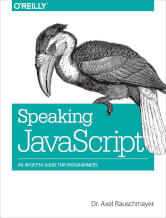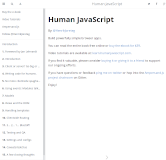Last Updated on February 14, 2025
10. jQuery Fundamentals by Rebecca Murphey
 jQuery Fundamentals gives an overview of the jQuery JavaScript library. It aims to make you comfortable tackling problems. Example solutions to all exercises are given.
jQuery Fundamentals gives an overview of the jQuery JavaScript library. It aims to make you comfortable tackling problems. Example solutions to all exercises are given.
Chapters cover:
- JavaScript basics – covers the basic concepts of JavaScript, as well as some frequent pitfalls for people who have not used JavaScript before.
- jQuery basics – selecting elements, choosing selectors, refining & filtering selections, working with selections, CSS and more.
- jQuery core – utility methods, checking types, data methods, feature & browser detection, and more.
- Events – jQuery provides simple methods for attaching event handlers to selections.
- Effects – use the built-in settings, or provide a customized duration. You can also create custom animations of arbitrary CSS properties.
- Ajax – Asynchronous JavaScript and XML allows for web pages that provide rich, interactive experiences.
- Plugins – how to create a basic plugin, finding & evaluating plugins, writing plugins, and writing stateful plugins with the jQuery UI widget factory.
- Performance Best Practices – covers a number of jQuery and JavaScript best practices including selector optimization.
- Code Organization – looks at various code organization patterns you can use in your jQuery application and explores the RequireJS dependency management and build system.
- Custom Events – illustrates jQuery’s custom events system to make a simple Twitter search application.
The book is licensed under the Creative Commons Attribution-Share Alike 3.0 United States license.
11. Speaking JavaScript by Dr Axel Rauschmayer
 This book has been written for programmers, by a programmer. So, in order to understand it, you should already know object-oriented programming, for example, via a mainstream programming language such as Java, PHP, C++, Python, Ruby, Objective-C, C#, or Perl.
This book has been written for programmers, by a programmer. So, in order to understand it, you should already know object-oriented programming, for example, via a mainstream programming language such as Java, PHP, C++, Python, Ruby, Objective-C, C#, or Perl.
This book focuses on the JavaScript language proper. For example, you won’t find information on programming web browsers (DOM, asynchronous programming, etc.).
This book teaches ECMAScript 5, the current version of JavaScript that is supported by all modern engines.
12. Human JavaScript by Henrik Joreteg
 Discover a better way of thinking about advanced JavaScript application development.
Discover a better way of thinking about advanced JavaScript application development.
You’ll gain a strong foundation for building amazing web app experiences in a logical way.
You’ll understand the philosophy behind how to make decisions with your app structure.
No magic frameworks. No monolithic toolkits. You’re going to work with proper, real-life JavaScript in a way you’ll understand, and with explanations that help you learn how to make great choices as you build your apps.
Next page: Page 5 – JavaScript Bible and more books
Pages in this article:
Page 1 – You Don’t Know JS (book series) and more books
Page 2 – JavaScript Enlightenment and more books
Page 3 – Developing Backbone.js Applications and more books
Page 4 – jQuery Fundamentals and more books
Page 5 – JavaScript Bible and more books
Page 6 – Object-Oriented JavaScript and more books
All books in this series:
| Free Programming Books | |
|---|---|
| Ada | ALGOL-like programming language, extended from Pascal and other languages |
| Agda | Dependently typed functional language based on intuitionistic Type Theory |
| Arduino | Inexpensive, flexible, open source microcontroller platform |
| Assembly | As close to writing machine code without writing in pure hexadecimal |
| Awk | Versatile language designed for pattern scanning and processing language |
| Bash | Shell and command language; popular both as a shell and a scripting language |
| BASIC | Beginner’s All-purpose Symbolic Instruction Code |
| C | General-purpose, procedural, portable, high-level language |
| C++ | General-purpose, portable, free-form, multi-paradigm language |
| C# | Combines the power and flexibility of C++ with the simplicity of Visual Basic |
| Clojure | Dialect of the Lisp programming language |
| ClojureScript | Compiler for Clojure that targets JavaScript |
| COBOL | Common Business-Oriented Language |
| CoffeeScript | Transcompiles into JavaScript inspired by Ruby, Python and Haskell |
| Coq | Dependently typed language similar to Agda, Idris, F* and others |
| Crystal | General-purpose, concurrent, multi-paradigm, object-oriented language |
| CSS | CSS (Cascading Style Sheets) specifies a web page’s appearance |
| D | General-purpose systems programming language with a C-like syntax |
| Dart | Client-optimized language for fast apps on multiple platforms |
| Dylan | Multi-paradigm language supporting functional and object-oriented coding |
| ECMAScript | Best known as the language embedded in web browsers |
| Eiffel | Object-oriented language designed by Bertrand Meyer |
| Elixir | Relatively new functional language running on the Erlang virtual machine |
| Erlang | General-purpose, concurrent, declarative, functional language |
| F# | Uses functional, imperative, and object-oriented programming methods |
| Factor | Dynamic stack-based programming language |
| Forth | Imperative stack-based programming language |
| Fortran | The first high-level language, using the first compiler |
| Go | Compiled, statically typed programming language |
| Groovy | Powerful, optionally typed and dynamic language |
| Haskell | Standardized, general-purpose, polymorphically, statically typed language |
| HTML | HyperText Markup Language |
| Icon | Wide variety of features for processing and presenting symbolic data |
| J | Array programming language based primarily on APL |
| Java | General-purpose, concurrent, class-based, object-oriented, high-level language |
| JavaScript | Interpreted, prototype-based, scripting language |
| Julia | High-level, high-performance language for technical computing |
| Kotlin | More modern version of Java |
| LabVIEW | Designed to enable domain experts to build power systems quickly |
| LaTeX | Professional document preparation system and document markup language |
| Lisp | Unique features - excellent to study programming constructs |
| Logo | Dialect of Lisp that features interactivity, modularity, extensibility |
| Lua | Designed as an embeddable scripting language |
| Markdown | Plain text formatting syntax designed to be easy-to-read and easy-to-write |
| Objective-C | Object-oriented language that adds Smalltalk-style messaging to C |
| OCaml | The main implementation of the Caml language |
| Pascal | Imperative and procedural language designed in the late 1960s |
| Perl | High-level, general-purpose, interpreted, scripting, dynamic language |
| PHP | PHP has been at the helm of the web for many years |
| PostScript | Interpreted, stack-based and Turing complete language |
| Prolog | A general purpose, declarative, logic programming language |
| PureScript | Small strongly, statically typed language compiling to JavaScript |
| Python | General-purpose, structured, powerful language |
| QML | Hierarchical declarative language for user interface layout - JSON-like syntax |
| R | De facto standard among statisticians and data analysts |
| Racket | General-purpose, object-oriented, multi-paradigm, functional language |
| Raku | Member of the Perl family of programming languages |
| Ruby | General purpose, scripting, structured, flexible, fully object-oriented language |
| Rust | Ideal for systems, embedded, and other performance critical code |
| Scala | Modern, object-functional, multi-paradigm, Java-based language |
| Scheme | A general-purpose, functional language descended from Lisp and Algol |
| Scratch | Visual programming language designed for 8-16 year-old children |
| SQL | Access and manipulate data held in a relational database management system |
| Standard ML | General-purpose functional language characterized as "Lisp with types" |
| Swift | Powerful and intuitive general-purpose programming language |
| Tcl | Dynamic language based on concepts of Lisp, C, and Unix shells |
| TeX | Markup and programming language - create professional quality typeset text |
| TypeScript | Strict syntactical superset of JavaScript adding optional static typing |
| Vala | Object-oriented language, syntactically similar to C# |
| VHDL | Hardware description language used in electronic design automation |
| VimL | Powerful scripting language of the Vim editor |
| XML | Rules for defining semantic tags describing structure ad meaning |

sorry 8- Link ????
All the links are working